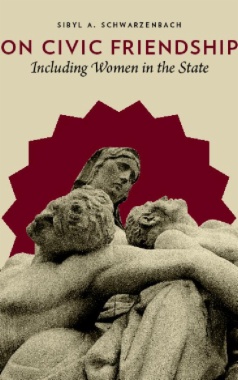Women have performed the vast majority of often unpaid friendship labor for centuries. Embodying the freedom, equality, and ideals of the Constitution, civic friendship emerges as a necessary condition for genuine justice. Through a critical examination of social and political relationships from ancient times to today, Sibyl Schwarzenbach develops a truly innovative, feminist theory of the democratic state.
Beginning with an analysis of Aristotle's notion of political friendship, Schwarzenbach brings the philosopher's insights to bear on the social and political requirements of the modern state. She elaborates a conception of civic friendship that, with its ethical reproductive praxis, functions differently from male-centered notions of fraternity and, with its female participants, remains fundamentally separate from generalized, male-inflected claims of Marxist solidarity. Schwarzenbach also distinguishes civic friendship from feminist calls for public care, arguing that friendship, unlike care, not only is reciprocal but also seeks to establish and maintain equality.
Schwarzenbach concludes with various public institutions-economic, legal, and social-that can promote civic friendship without sacrificing crucial liberties. In fact, women's entrance into the public sphere en masse makes such ideals realistic within a competitive, individualistic society.
- Contents
- Preface: A Paradox of Democracy
- Acknowledgements
- 1. Introduction: Metaphor and Theory Change
- 1.1 The Problem of Social Unity
- 1.2 Locke's Metaphor of Mixing One's Labor
- 1.3 The Need for a New Metaphor
- 1.4 Remarks on Philosophical Method
- Part I. The Past
- 2. The Forgotten Category of Ethical Reproduction
- 2.1 The Presumed Nonrationality of the Reproductive Soul
- 2.2 Aristotle's Human Function Argument
- 2.3 An Ethical Reading of Reproduction (The Threptikon)
- 2.4 Production Versus Reproduction
- 2.5 Ethical Reproductive Praxis
- 2.6 Personal Friendship (Philia)
- 2.7 Political Friendship
- 2.8 Conclusion
- 3. The Liberal Production Model
- 3.1 Developments of the Modern Period
- 3.2 Locke and the Production Model
- 3.3 Stewardship versus Private Property
- 3.4 Two Models of Political Autonomy
- 3.5 The Modern Citizen as Producer and the Two Moral Powers
- 3.6 A Brief Note on Utilitarianism
- 3.7 Conclusion
- 4. The Socialist Turn: Missing Faculties
- 4.1 The Aristotelian Influence
- 4.2 Marx's 1844 Manuscripts
- 4.3 Rawl's Misreading of Marx
- 4.4 The Absence of the Category of Reproductive Praxis
- 4.5 The Emotions and Their Role in Practical Reason
- 4.6 The Work of Care (versus Sympathy)
- 4.7 Marx's "Copernican Revolution"
- 4.8 Social Labor: Missing Faculties
- Part II. The Present
- 5. The Possibility of a Modern Civic Friendship
- 5.1 Conceptions of State and Economy
- 5.2 Rawl's Principle of Fraternity
- 5.3 The Indeterminacy of the Difference Principle
- 5.4 An Alternative Model of Social Labor
- 5.5 Toward a New Conception of Ownership
- 5.6 Civic Friendship in the Economic Domain
- 6. Women, Democracy, and the U.S. Constitution
- 6.1 The Lacuna in the Representation of Women
- 6.2 The Analysis of What is Lacking
- 6.3 Reflective Equilibrium and Constitutional Interpretation
- 6.4 The Founding Period and "Friends of Mankind"
- 6.4 Revisition Reconstruction
- 6.5 Revisiting Reconstruction
- 6.6 Rectifying the Lacuna in Representation
- 6.7 Friendship and Democracy
- 7. The State of Feminist Theory
- 7.1 The State Revisited
- 7.2 Earlier Feminist Positions
- 7.3 Care Theory: Motherhood or Friendship?
- 7.4 Three Models of Public Care
- 7.5 Reply to Objections
- 7.6 A Note on Discourse Ethics
- 7.7 The New State: Liberty, Equality and Civic Friendship
- 8. Looking Outward: Beyond the National Security State
- 8.1 International Philia?
- 8.2 International Relations and Structural Anarchy
- 8.3 A Global Difference Principle?
- 8.4 Back to the Drawing Board: Acological Concerns
- 8.5 A Final Note on Terrorism
- Notes
- Index

